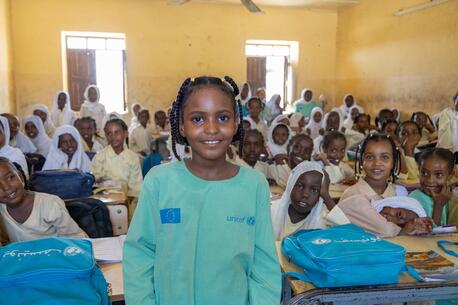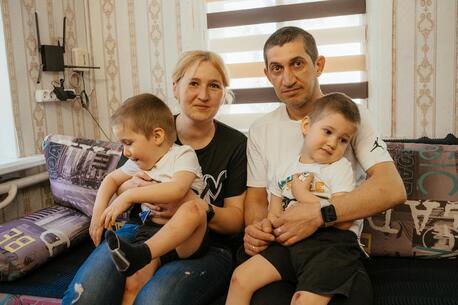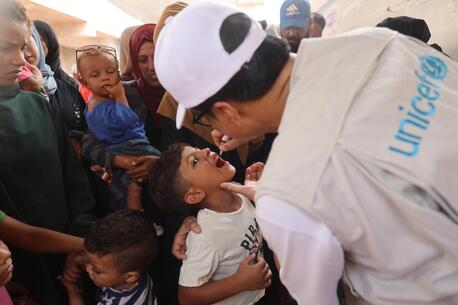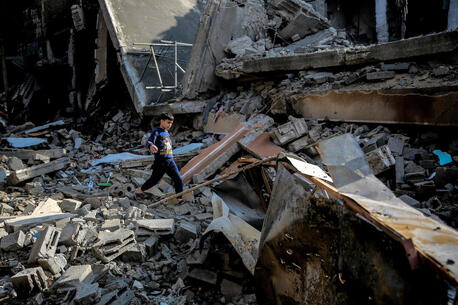
What It's Like to Be a Child in Gaza Right Now
UNICEF is calling for an immediate and long-lasting humanitarian ceasefire in the Gaza Strip. As the situation continues to deteriorate, a look at life on the ground, through children's eyes.
Children are not responsible for war, but they pay the highest price
Months of intensive bombardment have destroyed homes and neighborhoods in the Gaza Strip, leaving hundreds of thousands of people homeless and on the brink of famine.
Gaza's children face dwindling access to medical care and essential supplies, a lack of safe water and sanitation, physical injuries, and the trauma of losing family members and the comforts of home. Here, they share their stories of pain and loss, and their hopes for the future.

" I miss my school. I miss studying. I miss all the details of my life before the war." — Maha, 11
Maha, 11, sits on the rubble of a house in Rafah, southern Gaza Strip on Jan. 8, 2024. “ I wish the war would end soon. I want to go back to my school, I miss my teachers and my friends,” she said.

"Whenever I hear the loud explosions, I rush to my mom and cry." — Salah, 6
Forced to evacuate their home, 6-year-old twin brothers Salah and Ameer sleep on the floor of a tent in a shelter for internally displaced persons in Rafah with their parents, 10-year-old brother, Mohammed, and sisters Dalia, 9, and Maria, 4.
Mohammed has been battling cancer since he was 3 months old. "I want to return home desperately and play with all my toys," he said.

“My family was killed, and my leg was amputated." — Razan, 11
When the house next door was bombed, 11-year-old Razan's left leg was seriously injured. "We were waiting for a taxi to evacuate us from our neighborhood, [when] suddenly an explosion occurred, and I woke up to find myself in the hospital," she said. The explosion in al Zaytoon, Gaza City, killed her mother, father and three brothers. Without access to the appropriate treatment, doctors were forced to amputate her leg.
Razan was hospitalized first at Al-Shifa Hospital, then forced to move to Deir Al-Balah and then to a tent in Rafah. “Becoming an orphan has turned my life upside-down,” she said. ”I wish that this war reaches an end soon, and I could get good treatment that would help me live my life as normal as it can be again.”

"I love my family very much and I am afraid that I will lose them because of the war or that they will be killed one day." — Kareem, 11
Kareem, 11, says that he lives in constant fear of losing his family. "I think about that all the time," he said. "Sometimes I dream about it.” UNICEF estimates that at least 17,000 children in the Gaza Strip are unaccompanied or separated from their parents.
“I hope to return to my home as soon as possible, and I hope to play football in the courtyard of our house, which was destroyed by repeated bombardments.”
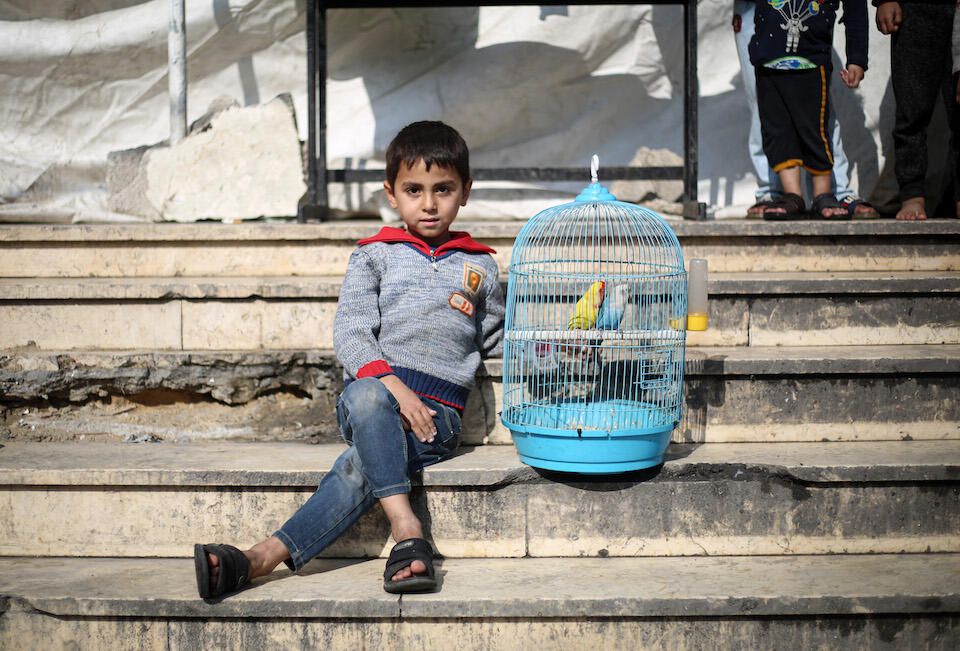
"I wish the war would end soon, so I could go back to my room, my neighborhood and my friends." — Fares, 6
Six-year-old Fares, originally from Khan Younis City, was forced to move with his family to Rafah City, due to the continued hostilities. Unable to abandon his pet birds, he took them with him. " I love my two birds, they are my best friends now and I take good care of them,” he said.

"Even if we lived on top of the rubble of our house, we would want to return there. I want it to end, so we can go home." — Abedalrahman, 13
Home right now for 13-year-old Abedalrahman is a tent in a shelter center located on the grounds of Al-Aqsa University in Gaza City.
He said he misses his mother, who was killed in the war on Oct. 31, 2023. “She would cook us delicious food — spaghetti, maftool, grape leaves and stuffed vegetables.” He plays with other children at the shelter and said he dreams of returning to his home.

"I want peace to come so I can find somewhere safe to live." — Mays, 13
After the house where she and her family were staying was bombed, 13-year-old Mays woke up in Al Shifa hospital with burns on her body, a partially paralyzed face and a badly broken leg. Two of her sisters were killed in the blast.
Home for now is a tent in a shelter for displaced persons in Khan Younis' industrial zone in southern Gaza. “I am not fine living here, it is terrible," she said. "But it is better than living in a building. That scares me because of what happened. I was pulled out from under the rubble. This feels safer, however bad the living conditions are."
“I want to be able to walk. I want to walk to the beach and stay there for the whole day. I just want this war to end," said Mays. “I want to go to Türkiye and do my masters to be a lawyer, like my sister Nibal. I have never been to Türkiye but it is my favorite place I have always dreamed to go. I would study human rights law so I could defend myself and people like me."
Help UNICEF reach children caught in humanitarian crises. Your support can make a difference. Please donate.
HOW TO HELP
There are many ways to make a difference
War, famine, poverty, natural disasters — threats to the world's children keep coming. But UNICEF won't stop working to keep children healthy and safe.
UNICEF works in over 190 countries and territories — more places than any other children's organization. UNICEF has the world's largest humanitarian warehouse and, when disaster strikes, can get supplies almost anywhere within 72 hours. Constantly innovating, always advocating for a better world for children, UNICEF works to ensure that every child can grow up healthy, educated, protected and respected.
Would you like to help give all children the opportunity to reach their full potential? There are many ways to get involved.



